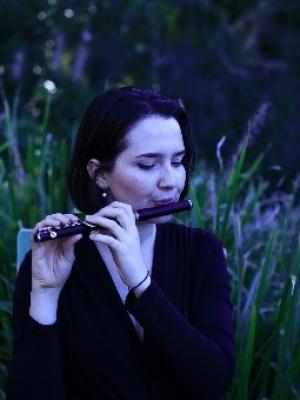Ella Kay-Butterworth
By Jasmine Collison, UQ’s Bachelor of Advanced Humanities student majoring in English Literature and History.
Ella Kay-Butterworth, recipient of UQ’s Joanne Tompkins and Alan Lawson Scholarship, has a theory: if you have a passion or interest, you should pursue it, because there will always be ways to make it worthwhile.
This sentiment encapsulates what the humanities are about, and is exactly what inspired Emeritus Professor Joanne Tompkins and Emeritus Professor Alan Lawson to establish Ella’s Scholarship through the Create Change Match in 2019. Together, the pair have over seventy years of experience as leading humanities researchers, educators, and administrators; with Joanne’s work focusing heavily on drama and literature; and Alan on higher education policy and postcolonial theory. The Tompkins - Lawson Scholarship seeks to support students like Ella who choose to pursue studies and careers in the humanities.
Growing up, Ella and her siblings were encouraged by their parents to pick a sport and an instrument. While Ella initially chose the piano, and then the violin, it was the flute, bought by her father for her mother’s birthday that ultimately took Ella’s fancy. Having now played the flute for 10 years, Ella also enjoys exploring other related instruments, including the alto flute and the piccolo.
This versatility will be beneficial for Ella to create a career out of music – she hopes to complete further tertiary education overseas after her bachelor’s degree. In the interim, she has been playing with the Brisbane Philharmonic Orchestra, the Queensland Youth Symphony, and the UQ Symphony Orchestra to practice and enhance her skillset.
Ella strongly believes that the importance of the arts should not be underestimated. Throughout her studies at UQ, Ella has experienced firsthand how studying music has involved lessons in abstract and critical thinking, concepts of social performativity and the dynamics of human behaviour and forging interpersonal connections.
For Ella, studying music has been a lesson in breaking creative barriers. Her humanities studies have shown that “you can’t [always] keep climbing the ladder or keep following the steps” and expect to make progress, to solve problems or to forge a career. Sometimes, you have to create opportunities, and think critically and creatively to find solutions in an abstract, undefined space.
Alongside this, Ella has also observed that -
“it is interesting to study performance in a formal setting because so much of life at the moment is a performance. We live our lives on social media, we live our lives online, and everything is about how other people react to us instead of how we impact the world. I think that is the important part of the humanities – to study what it is to be human, even if it is through the distorted and perfectionistic lens of classical music performance”.
Again, Ella’s sentiment is clear here: there are lessons to be learned in the humanities that have resonance in contexts that are, at least superficially, vastly different. Humanities focuses on key principles and skills that are highly transferrable and form a solid foundation for other studies and pursuits.
Speaking of her experiences throughout COVID, Ella highlights that, “science and STEM went on, and the arts and humanities suffered. But it’s the first thing people want back – the first thing they notice is missing from their lives is that connection to other people in a way that is not necessarily goal-driven, but rather, motivated by a need for human connection and aesthetic enjoyment”. Her love of music stems from the fact that -
“music is the ultimate expression of being able to connect with someone on a level that doesn’t require language”.
This harkens back to the foundational aim of the humanities, and especially of the arts – to connect with people. Humanities disciplines are constantly working towards improving our understanding of people, how they live and what they feel. Ella finds that people often see music and the arts as inaccessible, “which is sad because from the inside, all we’re ever trying to do is get back and connect back to an audience. We want nothing more than for it to be approachable. Like everything in our hyperconnected world, the whole aim is trying to connect, interact and inspire.”
At times, Ella has found studying classical music in Australia challenging – “there is not the audience you wish there was”. Students must also dedicate hours of their time to individual practice, group rehearsals and travel between various ensembles. However, Ella remains hopeful that, in the process of negotiating COVID and other global and national challenges, we will continue to return to the activities and passions that bring us together and foster our connections with one another, activities that primarily reside in the domain of the humanities.
To anybody considering pursuing studies in the arts or applying for a HASS scholarship, Ella’s advice is to just “go for it”. Studying music has reinforced the importance of persistence for Ella - she recognises that “it always comes back to determination and discipline. When you’re dealing with a practical art, that is the challenge at the end of the day”.
Support students, like Ella, by donating to the HASS Scholarship Fund.

